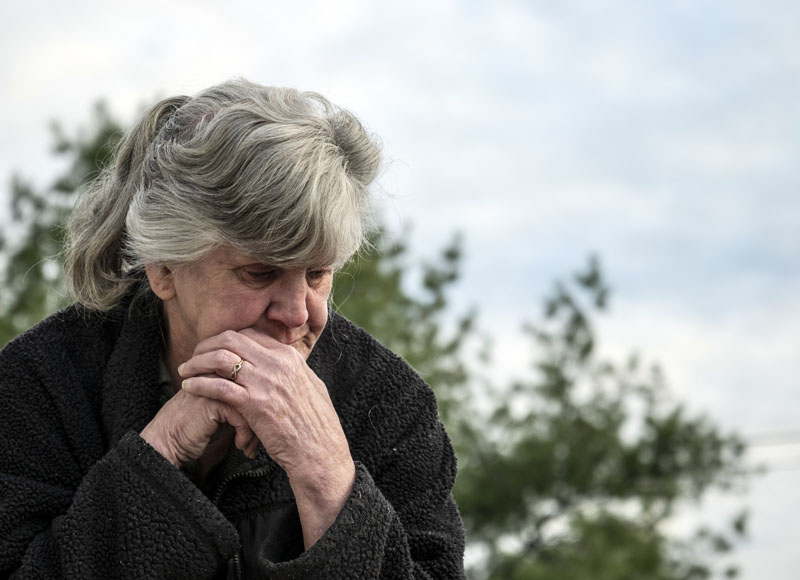
Viola Stone stands outside her camper home in Waldoboro on May 4. The camper does not have the minimum 750 square feet of living space the town requires. (Bisi Cameron Yee photo)
Last fall, Waldoboro resident Viola Stone’s trailer went up in flames. She and her family have replaced it with a newer and better structure, but violations of town regulations have left her unable to return to the property she calls home.
On Nov. 8 around 9 p.m., a fire broke out in the fifth-wheel RV with an addition on North Nobleboro Road where Stone had lived for the past 15 years. Stone’s home, her possessions, her savings, and her pets were all lost.
“Something put me on the floor and told me to crawl and I did,” she said. “I thanked God when I got outside.”
The fire was ruled accidental, the likely cause a spark from a wood stove. Since then, Stone has stayed in a cabin offered to her as temporary housing by members of her church. But the cabin is contracted as a vacation rental for the upcoming season. According to daughter-in-law Rachel Lane, as of Saturday, May 8, Stone is effectively homeless.
Stone, 76, is originally from Massachusetts, one of 21 children. She has lived in Waldoboro for over 25 years. She lives on a limited income; her part-time job at Dollar Tree in Damariscotta supplements her Social Security.
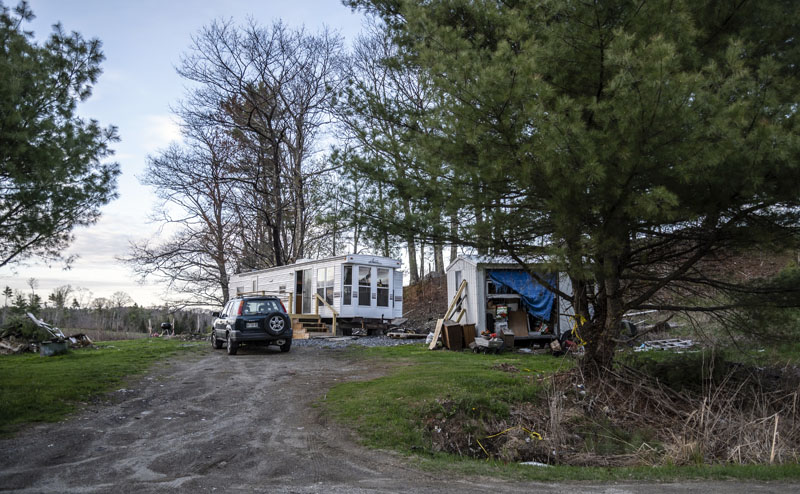
Viola Stone’s camper home sits on the same footprint as her previous one, which burned in November 2020. Stone has lived on the property for 15 years. (Bisi Cameron Yee photo)
In January, Stone purchased a camper with money from a GoFundMe account set up after the fire. Her family helped her clean up the lot where she had lived and placed the camper in the same position as her previous home.
Her son and grandson connected the camper to water and septic service, but when they attempted to connect her to power, the town of Waldoboro denied the certificate of occupancy she needed to move in.
The town’s land use ordinance specifies certain specifications for single-wide mobile homes. They must have at least 750 square feet of living space and their construction must meet standards set by the U.S. Department of Housing and Urban Development.
Stone did not expect to encounter any issues with replacing her home. The new camper is an improvement over the previous one. The property has been cleaned up. The property owner welcomed her back. And trailer living is not uncommon in Waldoboro.
Stone bought a 2001 Breckenridge Park Model camper for $6,000 on Jan. 23 and moved it to Waldoboro on March 18.
According to Lane, the camper has approximately 440 square feet of space, including two bump-outs and an added deck. “We built a gorgeous deck for her,” Lane said.
“The new trailer is so much better. It’s newer and bigger than her old trailer,” Lane said. She estimated that the old camper dated to the 1970s or ’80s.
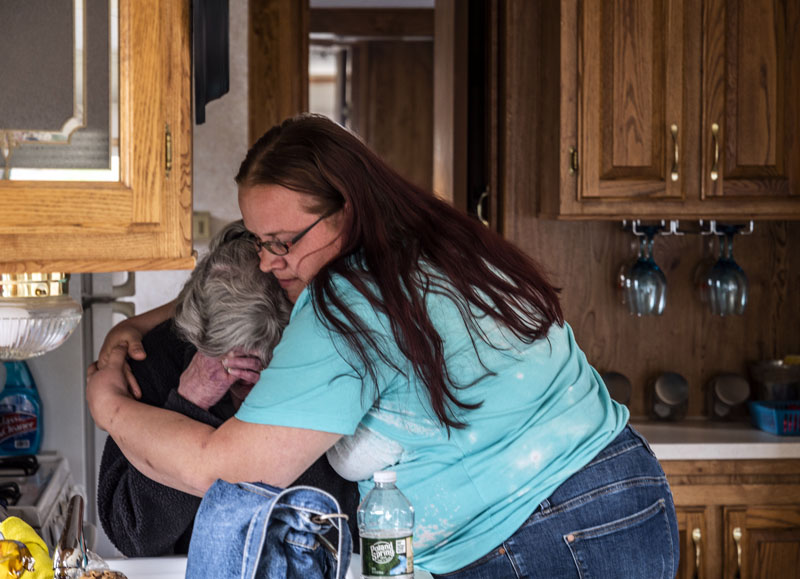
Rachel Lane hugs mother-in-law Viola Stone as Stone is overcome by emotion in Waldoboro on May 4. Stone lost her home, pets, and all her possessions in a fire last November. (Bisi Cameron Yee photo)
The replacement camper has a propane furnace and Lane said it will have a propane monitor. Stone’s son and grandson are making storm windows and adding insulation and skirting.
It is not uncommon for park model campers to be used as residences, although the RV Industry Association states that “due to their design, small size, and use as recreation, vacation, and seasonal units, park model RVs are explicitly excluded from being considered or used as a manufactured home under the codes and regulations of the U.S. Department of Housing & Urban Development.”
Lane said the family does not want to go to the town for help because they have become so frustrated. She said trailers are common in Waldoboro, and many are smaller and in worse shape than Stone’s.
Stone said, “I got mad and walked out when they told me I would need to replace the trailer.”
Lane has been researching laws and ordinances and communicating on Stone’s behalf. She said Stone has a learning disability and has trouble understanding and navigating the paperwork requested by the town.
On Thursday, May 6, Lane represented Stone before the Waldoboro Board of Appeals. Stone watched the proceedings remotely.
During the meeting, Lane agreed that the town had not made an error, but requested a variance that would allow Stone to live in the trailer.
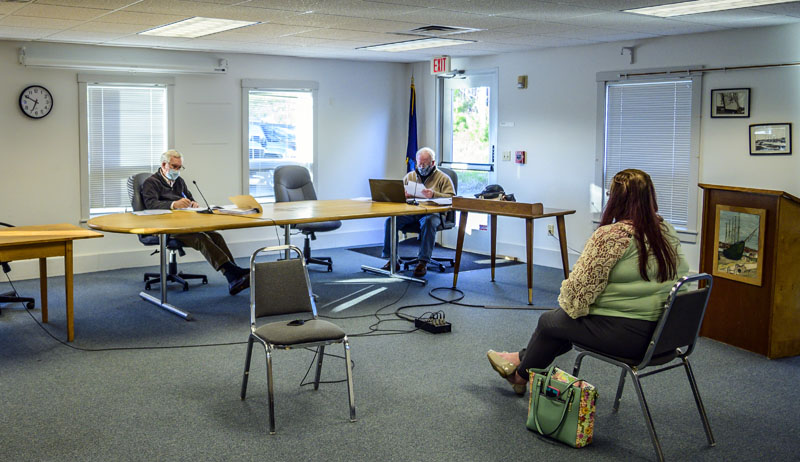
Rachel Lane requests a variance from the Waldoboro Board of Appeals on May 4. Lane represented her mother-in-law, Viola Stone, who watched the proceedings remotely. (Bisi Cameron Yee photo)
The board denied Stone’s appeal, since there was no error to justify overturning the code enforcement’s officer’s decision. But afterward, board members reviewed the ordinance in an effort to find a way they could allow a variance. They discussed several possible avenues, but determined that further work would be necessary to find a solution.
In the meantime, Lane does not know where Stone will go and said she will probably live in her car. Lane said that she and her husband live in Chelsea, which is too far for Stone to safely travel to her job. Lane said other family members lack the means to help.
Lane said they spent approximately $7,000 on the trailer and $2,000 on the cleanup. Including modifications to the trailer, such as the deck and materials to set up the septic and add insulation, they have spent a total of around $12,000.
Lane said they do not have a building permit, but she doesn’t believe they should need one because “we’re not building it, we’re replacing the home she lost.”
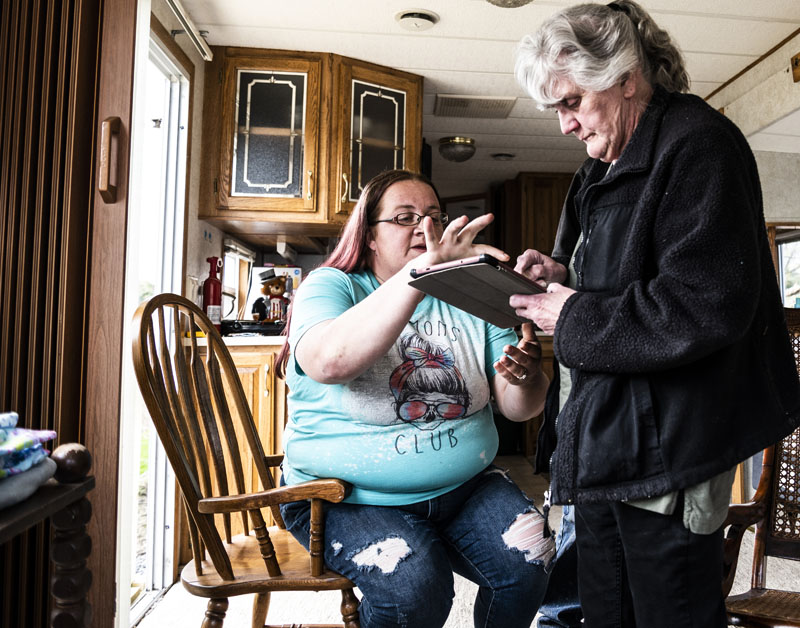
Rachel Lane helps her mother-in-law, Viola Stone, sign documents with her tablet in Waldoboro on May 4. Lane is helping Stone navigate the paperwok needed to bring a case in front of the town’s appeals board. (Bisi Cameron Yee photo)
However, the town requires building permits for both construction and remodeling projects to ensure the work complies with building codes and the structures are safe. The permanent placement of the camper, the addition of insulation, and the addition of the deck are all projects that could require inspection.
“We want to try to do everything legally so that there are no repercussions in the future,” Lane said. “We don’t want her to get in any trouble.”
Waldoboro Town Manager Julie Keizer said the town suggested that Stone sell the RV and buy a housing unit that meets the code. “It’s about safe housing,” she said.
Regarding trailers elsewhere in town, the land use ordinance grandfathers pre-1976 single-wide mobile homes in place prior to the adoption of the ordinance in 2005.
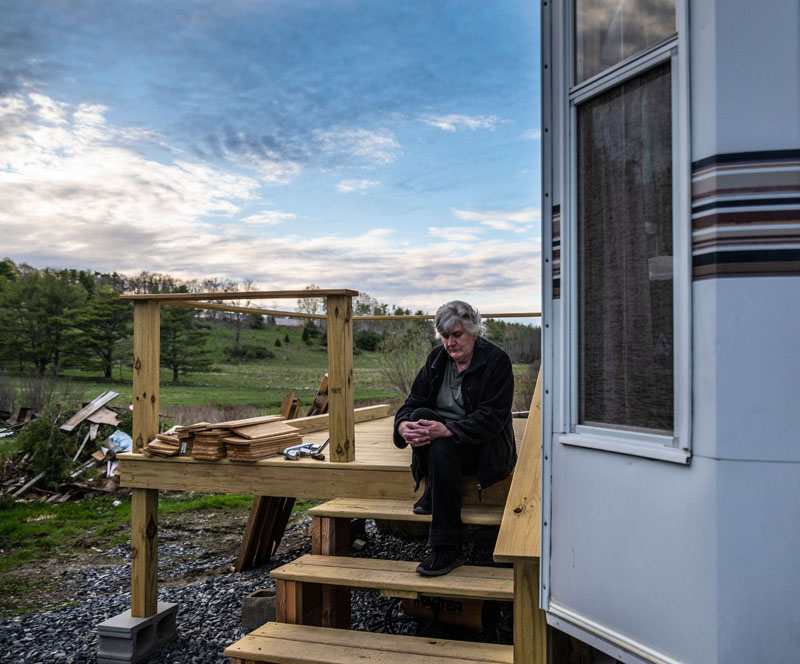
Viola Stone sits outside her trailer on the property she considers home in Waldoboro on May 4. The park model camper does not comply with the town’s land use ordinance. (Bisi Cameron Yee photo)
While Stone’s prior trailer may or may not have met those ordinance requirements, the newer trailer does not. It’s likely that many residents live in trailers that do not meet the standards, but Keizer said, “How do you remove people from their home in a good way? This is part of generational poverty, which is not an easy cycle to break.”
The town office referred Stone to its community navigator for housing assistance and as a general resource, but Stone has not met with her.
According to Lane, while Stone worked hard most of her life as a housekeeper in nursing homes, hotels, and private homes, she does not have the means to find another housing situation. “She has literally nothing,” Lane said.
And Stone doesn’t want to live anywhere else. “I like the quiet, and the cows on the farm who come down to see me. I just want to come home,” Stone said. “This is a nice little place.”



